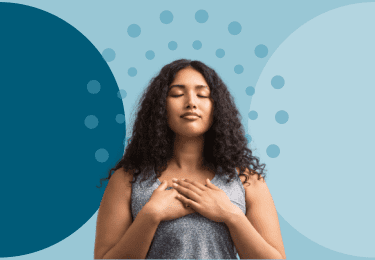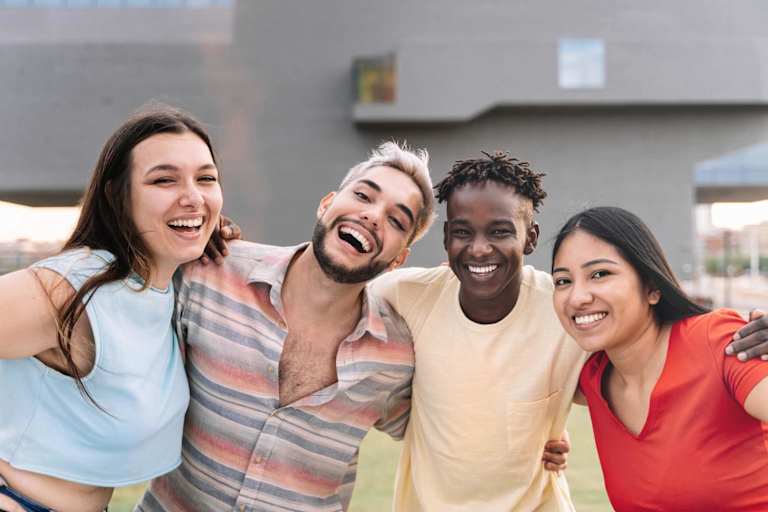Mental Health for LGBTQ+ Students
- LGBTQ+ students deserve mental health support that affirms their experiences.
- Discrimination and anti-LGBTQ+ legislation negatively impact LGBTQ+ students’ mental health.
- LGBTQ+ people experience medical gatekeeping, which creates barriers to quality care.
College can be a stressful and complex time in a student’s life. The health disparities LGBTQ+ students face can negatively impact their mental wellness.
LGBTQ+ communities are impacted by various forms of oppression and continue to face discrimination, rejection, and legislative attacks that impact their daily lives. In spite of these obstacles, LGBTQ+ communities fight to overcome health disparities and work to challenge medical practices that dishonor their identities.
Robin Hornstein, Ph.D., suggests asking therapists whether they are an ally or in the LGBTQ+ community when seeking mental health support. She also states that LGBTQ+ students should “be clear if you are coming for support about being queer or not, as you don’t need someone who wants to only focus on one part of you. You want someone who is understanding of who you are, what your mental health issues are, and if the issues you are coming in for are related to being queer or not — relevant to what the issue is at the time you are seeking services.”
This guide focuses on LGBTQ+ students’ mental wellness and discusses different types of mental health support. Learn about barriers to receiving support and discover ways to make informed choices about your care.
Types of Mental Health Support
You shoudl research the type of mental health support that suits you best. However, one consistent thing to consider is the care and intentionality of the provider. Hornstein, Ph.D., states, “the mental health center needs to show solidarity and support in their available materials, website, and posters by demonstrating plenty of welcome and pride to incoming clients.”
1. In-person therapy: This is a common, traditional route for mental health support. There are various types of therapies designed to meet different goals and needs. When searching for a therapist, explore the ways practitioners and clinics define their approaches to therapy. Ask about their philosophies on and experience working with others — perhaps specifically those who share some of your identities. You should also consider whether you can trust them enough to understand and support you to make your sessions effective.
2. Telehealth/Teletherapy: This type of therapy boomed during the COVID-19 pandemic. Clients can meet with a therapist via video streaming without meeting in person. When possible, you can consider some of the same aspects of compatibility described above.
3. Support Groups: Campus or community support groups address shared experiences through different formats such as peer-to-peer support, counselor facilitated meet-ups or culturally-based group healing sessions. LGBTQ+ Campus Support Services and Centers: Support staff at LGBTQ+ centers on campuses can connect students to community resources, building connections and working to improve learners’ mental health.
4. Health and Wellness Services: Programs on campus or in the surrounding community may offer a variety of additional services to support student wellness, including 24/7 emergency response, counseling centers, and tailored services for many different populations.
Barriers to Mental Health Support for LGBTQ+ Students
Healthcare systems have historically been sources of uneasiness, harm, and frustration for LGBTQ+ people. When seeking out mental health support, LGBTQ+ people have to overcome and combat various hurdles to find affirming care.
A long-standing barrier for transgender and nonbinary folks is medical gatekeeping: obstacles that require unnecessary steps for care or practitioners who deny gender-affirming treatments and fail to offer culturally congruent care overall. Medical gatekeeping can make individuals feel less worthy of quality care. It also leads to poor health outcomes for LGBTQ+ patients.
Rose Parker, a graduate student and schizophrenia and psychosis advocate, named challenges for LGBTQ+ people based on her lived experiences. “I have early-onset schizophrenia and identify as queer. Many LGBTQ+ people with psychosis feel stigma because of their psychosis and fear invalidation of their gender or sexuality because of their symptoms, which often does happen. Many trans people are denied transition because of their psychosis. The LGBTQ+ community is often not accepting of psychosis, so even if people are able to talk about other mental health issues, they can’t talk about their psychosis, and this leads to isolation and alienation.”
Some mental health providers and decision-makers on college campuses admit they are not fully equipped to address the mental health needs of LGBTQ+ people. The Jed Foundation’s October 2021 Proud and Thriving Report and Framework found that only 58% of counselors and 57% of administrators surveyed believed they received adequate training to support LGBTQ+ students’ needs.
LGBTQ+ people do not only face barriers with individual therapists and mental health providers. They also encounter red tape with insurance and billing. LGBTQ+ people’s gender identity or sexual orientation are sometimes blamed as the cause for an illness. Many LGBTQ+ people are denied care because insurance does not deem their needs medically necessary.
“There is still currently stigma around therapy for marginalized groups, of which the LGBTQ community is part of. For college students, many may not have the resources available to afford therapy off campus, so they are limited to therapy providers in their schools’ counseling departments. There is no guarantee that the school will have LGBTQ-affirming providers. And additionally, LGBTQ students may feel stigmatized when attempting to seek care for LGBTQ-related issues.”
—Lisa Ibekwe, Licensed Clinical Social Worker
LGBTQ+ people may have difficulty even finding therapists due to increased demand and longer waitlists since the onset of the COVID-19 pandemic. According to the Trevor Project’s 2021 National Survey on LGBTQ Youth Mental Health, 48% of LGBTQ youth wanted mental health counseling in the last year but could not receive it.
These experiences may be heightened for individuals who hold multiple historically excluded identities. According to the Williams Institute at the University of California, Los Angeles, American Indian/Alaska Native (AIAN) LGBTQ+ adults are more likely to lack insurance or be underinsured than AIAN non-LGBT adults.
Choosing the Right Mental Health Support for You
You deserve affirming health care that centers you as an expert on your needs, body, and wellness. Identifying your priorities, being prepared with questions and data, and doing your research can help you establish care that aligns with your personal goals.
Ibekwe confirms, “Finding the right fit for you takes patience and diligence. I encourage all of my clients to do their research when looking for therapists to ensure they find someone that they feel truly fits them. This includes contacting therapists for consultations, checking out their websites, and even when meeting with a therapist that you have chosen, don’t feel scared to speak up. Therapy is about you so it is okay to ask the difficult questions to your therapist.”
LGBTQ+ students of color and other minority students may encounter barriers to mental wellness support. Using tools to seek out competent therapists and culturally-relevant healing practices can give you a broader range of choices.
You should always prioritize your well-being. Do not continue care somewhere or with someone who is not affirming, understanding, or actively willing to learn how to address your specific needs. It is completely reasonable to discontinue care with a mental health practitioner who is discriminatory or dismissive of your experiences.
In addition to professional care, there’s always value in establishing personal practices to manage and maintain your mental health. Try different daily practice tools to figure out what helps you in moments of need.
Mental Health Resources for LGBTQ+ Students
Care Work: Dreaming Disability Justice
This book by Leah Lakshmi Piepzna-Samarasinha is a collection of essays identifying ways to build health systems and community care from a disability justice perspective.
Celebrating Our Magic
This document offers resources for AIAN transgender and Two-Spirit youth, their relatives and families, and their healthcare providers. Published by the Northwest Portland Area Indian Health Board, the toolkit provides extensive information on various areas of health for youth.
The Jed Foundation
JED is a nonprofit organization focused on emotional health and suicide prevention for teens and young adults.
Consortium of Higher Education LGBT Resource Professionals
The consortium maintains an interactive map of LGBTQ+ support service centers on college campuses across the country.
Rest for Resistance
This online mental health zine is designed by queer and trans people of color, offering supportive stories and healing modalities.
The Trevor Project
The Trevor Project provides 24/7 crisis support to LGBTQ+ youth, an online resource center, and access to counseling services.
Trans Lifeline
Trans Lifeline is a grassroots hotline and microgrant organization that provides direct emotional and financial support to trans people experiencing crises.
The Care We Dream Of
Written by Zena Sharman, this book of essays by LGBTQ+ healers, organizers, advocates, and health care practitioners examines how to transform our healthcare systems.
Inclusive Therapists
This directory helps individuals find culturally responsive, LGBTQ+ affirming, social justice-oriented therapists nationwide.
Anxiety & Depression Association of America
This organization offers LGBTQ+ resources and articles that promote the importance of identity and inclusion. The ADAA also helps members of the LGBTQ+ community find the right inclusive therapy provider and has an extensive library of webinars, articles, and general resources to help provide support and understanding.
FOLX Health
This online resource aids queer and trans folks in overcoming barriers to accessing various forms of medical care.
Don’t give up. Your rights, your life, and your healing matter just as much as the next person’s. It may not be an easy journey, but there are people out here that want to see you happy, healthy, and winning! Don’t be scared to speak up and ask questions when you are looking for the right fit.
—Lisa Ibekwe, Licensed Clinical Social Worker
Frequently Asked Questions About LGBTQ+ Mental Health
Are LGBTQ+ youth more prone to mental health challenges?Being LGBTQ+ doesn’t automatically mean someone faces mental health challenges. It is important not to pathologize, or assume someone is mentally unhealthy, just because they identify as LGBTQ+.
However — due to disproportionate experiences of discrimination and oppression, food and housing insecurity, poverty, and other barriers — LGBTQ+ people are statistically more likely to experience mental health challenges. Due to stigma and barriers to accessing quality healthcare, LGBTQ+ people may also avoid pursuing support, which could leave mental health challenges unaddressed over time.
According to the Trevor Project, a majority of LGBTQ+ youth indicate they’ve experienced discrimination at least once in their lives. Impacts of discrimination, harassment, microaggressions, and other instances of anti-LGBTQ+ violence have dire consequences on LGBTQ+ youths’ mental health.
Many college campuses try to prevent harm and address instances of LGBTQ+ discrimination to improve LGBTQ+ students’ health outcomes. Anti-LGBTQ+ legislation emboldens discriminatory behavior against LGBTQ+ people and correlates to spikes of LGBTQ+ youth calling crisis hotlines.
Mental health challenges that are common among LGBTQ+ youth revolve around identity questioning, sexual orientation, gender identity, relationships, rejection, dealing with oppression and discrimination, and managing trauma. For example, trans people may experience hardships related to gender dysphoria or accessing gender-affirming healthcare that supports their mental health. Intersex people may experience extensive trauma around nonconsensual procedures performed when they were infants.
Depression or anxiety can manifest in LGBTQ+ people as a particular outcome of unsupportive, discriminatory, or toxic environments. Unfortunately, rates of suicidal ideation and substance misuse are higher in LGBTQ+ communities.
With Advice From:

Dr. Robin Hornstein is a licensed psychologist, with nearly 40 years of experience treating clients from all backgrounds. Robin is a white, queer, cisgender woman specializing in LGBTQIA+ Concerns, Eating Disorders, Anxiety Disorders, Parenting and Fertility Concerns. She is a Master Certified Life Coach in addition to being a Psychologist. Robin offers therapy and life coaching via Telehealth in over 16 states across the US. Robin was co-owner and clinical director of HPA, a business that she sold May 2021 after building a large staff of over 45 prescribers and psychotherapists and serving the community for over 21 years.

Rose Parker is a Schizophrenia & Psychosis Advocate. She has a BSc in Psychology with Honors and is a graduate student in Clinical Mental Health Counseling. She’s been published by The Society for the Teaching of Psychology and Medical News Today. She has a sizable following on her Instagram @PsychosisPsositivity. She’s an essayist and Podcasts under the same handle as well.

The Comfy Place, LLC
Lisa Ibekwe is a young and zealous therapist who is passionate about her work with young people. She is a Licensed Clinical Social Worker in Georgia and is additionally licensed to serve Maine, Florida, Massachusetts, Vermont, New Hampshire, Utah, Rhode Island, and New Jersey where she works with children, teens, young adults, and families. Lisa describes her style of therapy as eclectic in nature with a strong undertone of trauma work intertwined into sessions. Lisa encourages and supports youth and adolescents on their journey of self-discovery and promotes independence throughout the lifespan. She is committed to involving the family in the therapeutic process as well and is passionate about creating a secure and fun environment for everyone to heal and grow. Her therapy motto is “to have fun, get real, and heal!”
DISCLAIMER: The information provided on this website is not intended or implied to be a substitute for professional medical advice, diagnosis, or treatment; instead, all information, content, and materials available on this site are for general informational purposes only. Readers of this website should consult with their physician to obtain advice with respect to any medical condition or treatment.
Explore More College Resources

Best Colleges for LGBTQ+ Students in 2024
The increased visibility of LGBTQ+ students on campuses has increased the need for support networks. Here are the top-ranked colleges for LGBTQ+ support.

by Cobretti D. Williams, Ph.D.
Updated December 12, 2024

College Experience Guide for LGBTQ+ Students
Explore common experiences and challenges of LGBTQ+ college students and learn how you can ensure your campus supports and affirms LGBTQ+ students.

by R.B. Brooks
Updated June 5, 2025


